Referral Cover Letter
[Your Name]
[Your Address]
[City, State ZIP Code]
[Your Email Address]
[Your Phone Number]
[Today's Date]
[Recipient's Name]
[Recipient's Title]
[Company Name]
[Company Address]
[City, State ZIP Code]
Dear [Recipient's Name],
I hope this letter finds you well. I am writing to express my strong interest in the [Position Title] at [Company Name] and to inquire if you would consider my application for the role. I was thrilled to learn about this opportunity from [Source of Referral], who highly recommended your organization and suggested that my skills and experience align well with the requirements of the position.
Having researched [Company Name]'s outstanding reputation for [specific quality or achievement], I am eager to contribute to the continued success and growth of the company. With [mention years of experience] years of experience in [mention relevant industry or field], I am confident in my ability to make a meaningful impact on the team.
My background in [specific skills or expertise] has allowed me to [mention notable achievements or contributions]. Through my previous work at [Previous Company] and [Other Previous Company], I have honed my skills in [specific areas relevant to the new role], and I am excited about the opportunity to leverage these abilities at [Company Name].
I am deeply passionate about [mention the field or industry] and believe that my blend of [mention key skills or qualifications] makes me a strong fit for the [Position Title] role. Moreover, I am eager to collaborate with the talented team at [Company Name] to drive innovation and achieve shared goals.
I have attached my resume, which provides additional details regarding my work history and accomplishments. I would be grateful for the chance to further discuss my qualifications in an interview.
Thank you for considering my application. I am eager to contribute my skills and dedication to the success of [Company Name]. I can be reached at [Your Phone Number] or [Your Email Address] at your earliest convenience.
Sincerely,
[Your Name]
Professional Job Referral Email
Subject: Referral for [Position Title] - [Your Name]
Dear [Hiring Manager's Name],
I hope this email finds you well. I am writing to express my strong interest in the [Position Title] role at [Company Name]. [Referrer's Name], who works as [Referrer's Position] in your [Department], suggested I reach out directly as they believe my background aligns perfectly with your team's needs.
With [X years] of experience in [relevant field/industry], I have developed expertise in [2-3 key skills relevant to the role]. In my current position at [Current Company], I have successfully [specific achievement that relates to the new role]. [Referrer's Name] and I worked together on [specific project/context], where they witnessed firsthand my ability to [relevant skill/accomplishment].
I would welcome the opportunity to discuss how my experience in [relevant area] and passion for [relevant field/company mission] can contribute to your team's continued success. I have attached my resume for your review and would be happy to provide additional information or schedule a conversation at your convenience.
Thank you for considering my application. I look forward to hearing from you soon.
Best regards,
[Your Name]
[Your Phone Number]
[Your Email Address]
Casual Internal Referral Email
Subject: Quick referral for the [Position] opening
Hi [Hiring Manager's Name],
Hope you're doing well! I heard through [Referrer's Name] that you're looking for someone for the [Position Title] role. They thought I might be a good fit, and honestly, I'm pretty excited about the possibility.
I've been working in [current role/department] for [time period] and have gotten really good at [relevant skills]. [Referrer's Name] and I collaborated on [project/situation] recently, and they saw how I [specific example of relevant work].
The role sounds like it would be a great next step for me, especially the part about [specific aspect of job that interests you]. I'd love to chat more about it when you have a few minutes.
Let me know if you'd like to see my updated resume or if there's a good time to grab coffee and talk!
Thanks,
[Your Name]
Executive Level Referral Letter
Subject: Executive Referral - [Your Name] for [Position Title]
Dear [Hiring Manager/Board Member Name],
I am writing at the recommendation of [Referrer's Name], [Referrer's Title], who suggested I contact you regarding the [Position Title] opportunity at [Company Name]. Given the strategic nature of this role, I believe my executive experience and proven track record make me an ideal candidate.
Throughout my [X years] career, I have consistently delivered results in challenging environments. As [Current/Recent Title] at [Company], I spearheaded [major initiative/transformation] that resulted in [quantifiable outcome]. My expertise spans [relevant areas], with particular strength in [specialized area relevant to new role].
[Referrer's Name] and I have worked together in [context - board, industry association, previous company], where they observed my approach to [relevant leadership challenge]. They specifically mentioned that my experience with [specific relevant experience] would be valuable for the challenges [Company Name] is currently facing.
I would appreciate the opportunity to discuss how my strategic vision and execution capabilities can contribute to [Company Name]'s continued growth and success. I am available for a confidential conversation at your convenience.
Thank you for your time and consideration.
Sincerely,
[Your Name]
[Your Title]
[Your Contact Information]
Academic Position Referral Letter
Subject: Application for [Position Title] - Referred by [Referrer's Name]
Dear Search Committee Members,
I am writing to express my interest in the [Position Title] at [University/Institution Name], as recommended by [Referrer's Name], [Referrer's Title] in your [Department]. Dr. [Referrer's Name] suggested that my research background and teaching philosophy would be an excellent match for your department's needs.
My doctoral work in [Field] at [University] focused on [research area], resulting in [publications/outcomes]. Since completing my Ph.D., I have [postdoc/teaching experience] where I have [relevant accomplishments]. Dr. [Referrer's Name] is familiar with my work through [conference presentation/collaboration/mutual research interest] and specifically encouraged me to apply given the department's emphasis on [relevant focus area].
My research interests align closely with your department's strategic priorities, particularly in [specific area]. I have [specific experience/skills] that would contribute to both the undergraduate and graduate programs. Additionally, my commitment to [relevant aspect - diversity, community engagement, interdisciplinary work] reflects the values I understand are important to your institution.
I have attached my CV, research statement, and teaching philosophy. I would welcome the opportunity to discuss my qualifications further and learn more about the department's vision for this position.
Thank you for your consideration.
Sincerely,
[Your Name], Ph.D.
[Your Current Position/Affiliation]
Career Change Referral Email
Subject: Career Transition Opportunity - [Your Name]
Dear [Hiring Manager's Name],
I hope this message finds you well. [Referrer's Name] from [their department/company] suggested I reach out to you about potential opportunities in [new field/department]. While my background is in [current field], I am excited about transitioning into [new field] and believe my transferable skills could bring fresh perspective to your team.
Although I am new to [new field], my [X years] experience in [current field] has given me strong skills in [transferable skills that apply]. For example, my work in [specific example] required [skills that translate], which I understand is valuable in [new field]. [Referrer's Name] observed these skills when we [context of how you know referrer] and thought they would translate well to your team's work.
I am particularly drawn to [new field] because [genuine reason for career change]. I have been preparing for this transition by [specific steps taken - courses, volunteering, reading, networking] and am eager to apply my passion and existing skills in a new context.
I would greatly appreciate the opportunity to discuss how my unique background and enthusiasm for [new field] could benefit your team. I am available for a conversation at your convenience.
Thank you for considering my interest.
Best regards,
[Your Name]
Freelance/Contract Work Referral Email
Subject: Freelance Opportunity Referral - [Your Name]
Hi [Contact Name],
[Referrer's Name] mentioned that you might be looking for freelance help with [specific project/area]. They thought my skills in [relevant expertise] would be a great fit for what you need.
I've been freelancing in [area] for [time period] and have worked with clients like [1-2 relevant client types or names if appropriate]. Recently, I helped [brief example of similar work] which resulted in [positive outcome]. [Referrer's Name] was familiar with my work through [context] and suggested I reach out directly.
I specialize in [specific services] and typically work with clients who need [type of support you provide]. My approach is [brief description of your working style/methodology], and I pride myself on [key strength - meeting deadlines, clear communication, quality work].
If you're interested, I'd be happy to discuss your project needs and provide some examples of similar work I've done. I can also put together a quick proposal outlining how I'd approach your specific situation.
Looking forward to potentially working together!
[Your Name]
[Your Website/Portfolio]
[Your Contact Information]
Internship Referral Email
Subject: Summer Internship Application - Referred by [Referrer's Name]
Dear [Hiring Manager's Name],
I am writing to apply for the [specific internship position] at [Company Name] for [time period]. [Referrer's Name], who [their relationship to company - works there, is an alumnus, etc.], encouraged me to apply after learning about my interest in [relevant field/industry].
I am currently a [year] at [University] studying [major], with coursework focused on [relevant classes]. Through my involvement in [relevant activities - clubs, projects, previous internships], I have developed skills in [relevant skills]. [Referrer's Name] learned about my background through [context - family friend, networking event, professor, etc.] and thought my enthusiasm for [relevant area] would make me a valuable intern.
I am particularly excited about [specific aspect of the internship or company] because [genuine reason]. I believe this internship would provide me with invaluable experience in [what you hope to learn] while allowing me to contribute my [relevant skills/perspective] to your team.
I have attached my resume and would welcome the opportunity to discuss my qualifications further. Thank you for considering my application.
Sincerely,
[Your Name]
[Your University Email]
[Your Phone Number]
Healthcare Provider Referral Letter
Subject: Patient Referral - [Patient Name]
Dear Dr. [Specialist's Name],
I am referring [Patient Name], DOB: [Date], for your evaluation and management of [specific condition/concern]. This referral comes at the recommendation of [Referrer - could be another physician, the patient's request based on friend's suggestion, etc.].
Patient presents with [brief clinical summary]. Current symptoms include [relevant symptoms]. Previous treatments have included [medications/interventions tried]. [Patient/Referring party] specifically requested referral to your practice based on [reason for specific referral - reputation, specialization, successful treatment of similar case, etc.].
Relevant medical history includes [pertinent medical history]. Current medications: [list if relevant]. The patient has been informed of the referral and is expecting your office to contact them to schedule an appointment.
I am available if you need any additional information or clarification regarding this patient's case. Please keep me informed of your findings and treatment recommendations.
Thank you for your expertise in managing this patient's care.
Sincerely,
Dr. [Your Name]
[Your Practice/Institution]
[Contact Information]
What is a Referral Cover Letter and Why Do You Need One
A referral cover letter is a targeted communication sent to a potential employer, client, or professional contact when you have been recommended by a mutual connection. Unlike cold applications, these letters leverage existing relationships to create warm introductions and establish immediate credibility. The primary purpose is to capitalize on the trust and rapport already built by your referrer, making your application or inquiry more likely to receive serious consideration.
The power of referral letters lies in their ability to bypass initial screening barriers that often filter out unknown candidates. They serve as a bridge between your qualifications and the recipient's needs, with the added weight of a trusted recommendation behind them.
Who Should Send Referral Cover Letters
- Job seekers who have been recommended by current employees, former colleagues, or industry contacts
- Professionals seeking new business opportunities through existing network connections
- Students applying for internships through professor or alumni recommendations
- Freelancers and consultants referred by previous clients or professional contacts
- Healthcare providers making patient referrals based on colleague recommendations
- Academic professionals recommended by peers in their field
- Career changers who have mentors or contacts in their target industry
- Anyone with a mutual connection who can vouch for their qualifications or character
Who Should Receive Your Referral Cover Letter
- Hiring managers or decision-makers at companies where you have internal referrals
- Department heads or team leaders when referred by current team members
- HR professionals when applying through employee referral programs
- Clients or prospects referred by existing customers or business partners
- Academic administrators when recommended by faculty or alumni
- Healthcare specialists when referred by primary care physicians or colleagues
- Professional contacts suggested by mutual connections in your industry
- Recruitment agencies when referred by placed candidates or industry contacts
When to Use Referral Cover Letters
- After receiving explicit permission from your referrer to use their name
- When applying for positions where you have internal employee recommendations
- Following networking events where contacts suggest specific opportunities
- When former colleagues reach out about openings at their new companies
- After informational interviews that lead to specific referrals
- When professors or mentors recommend academic or research positions
- Following successful project completions that generate client referrals
- During industry transitions when contacts help bridge career changes
- When participating in formal employee referral programs
- After receiving introductions through professional associations or alumni networks
How to Write and Send Effective Referral Cover Letters
Start by confirming with your referrer that they're comfortable with you using their name and understand the specific role or opportunity. Research both the position and the recipient to tailor your message appropriately.
Begin your letter by immediately mentioning your referrer and their relationship to both you and the recipient. Provide specific context about how your referrer knows your work or qualifications. Follow with a concise summary of your relevant experience, focusing on aspects most applicable to the opportunity.
Include specific examples that your referrer can vouch for, demonstrating the authenticity of the recommendation. Address any potential concerns proactively, especially if you're changing careers or have gaps in traditional qualifications.
End with a clear call to action and express gratitude to both your referrer and the recipient. Send the letter promptly while the referrer's recommendation is fresh, and always keep your referrer informed about the outcome.
Requirements and Prerequisites Before Sending
- Explicit permission from your referrer to use their name and mention their recommendation
- Clear understanding of the specific opportunity, role, or need you're addressing
- Updated resume or portfolio that aligns with the opportunity
- Research about the recipient, company, or organization you're contacting
- Understanding of your referrer's relationship with the recipient
- Specific examples ready that your referrer can validate if contacted
- Contact information for the appropriate decision-maker
- Knowledge of company culture, values, and current challenges when possible
- Preparation for potential follow-up conversations or interviews
- Professional email signature and contact information ready
Formatting Guidelines and Best Practices
Keep referral letters concise but substantive, typically 200-400 words for emails and up to 500 words for formal letters. Use a professional subject line that immediately identifies the referral source and purpose.
Structure your letter with a clear opening that mentions the referrer, a focused middle section highlighting relevant qualifications, and a strong closing with next steps. Use professional but warm tone that reflects the relationship context.
For digital communications, use standard business email formatting. For formal positions or conservative industries, consider traditional letter format even when sending electronically. Ensure error-free grammar and spelling, as the letter reflects both your professionalism and your referrer's judgment.
Choose timing carefully - send during business hours on Tuesday through Thursday when possible. Include relevant attachments like resumes but keep the initial email focused and scannable.
Follow-up Actions After Sending Your Referral Letter
Inform your referrer immediately after sending the letter, sharing what you sent and when. This allows them to prepare for potential contact from the recipient and shows respect for their recommendation.
Wait 5-7 business days before following up if you haven't received a response. Send a brief, polite follow-up that reiterates your interest and availability for discussion.
If you receive a positive response, schedule any requested meetings promptly and prepare thoroughly. Keep your referrer updated on progress, especially positive developments or offers.
For negative responses or no response after reasonable follow-up, thank your referrer for their support and maintain the relationship for future opportunities. Document lessons learned for improving future referral approaches.
Always send thank-you notes regardless of outcome, acknowledging both your referrer's support and the recipient's time in considering your application.
Common Mistakes to Avoid
Never send a referral letter without explicit permission from your referrer. Don't exaggerate your relationship with the referrer or misrepresent their level of recommendation. Avoid generic templates that don't reflect the specific referral context or opportunity.
Don't make your referrer do the work - they provided the introduction, but the follow-through is your responsibility. Avoid putting your referrer in awkward positions by misrepresenting facts they might be asked to verify.
Don't send referral letters for positions you're not qualified for, as this reflects poorly on your referrer's judgment. Avoid lengthy letters that bury the referral connection or fail to clearly state your purpose.
Never forget to keep your referrer informed about outcomes, positive or negative. Don't assume one referral letter is sufficient - follow up appropriately but don't become pushy or desperate.
Advantages and Disadvantages of Referral Cover Letters
Advantages include immediate credibility boost through trusted recommendations, higher likelihood of application review and response, faster hiring processes due to pre-established trust, access to hidden job markets through internal networks, and stronger positioning against other candidates.
Potential disadvantages include dependency on others' availability and willingness to refer, limited control over timing and presentation, possible awkwardness if referral doesn't lead to opportunities, risk of damaging relationships if poorly handled, and potential disappointment if expectations don't match reality.
The benefits typically outweigh the risks when referral letters are handled professionally and appropriately, making them valuable tools in career advancement and business development.

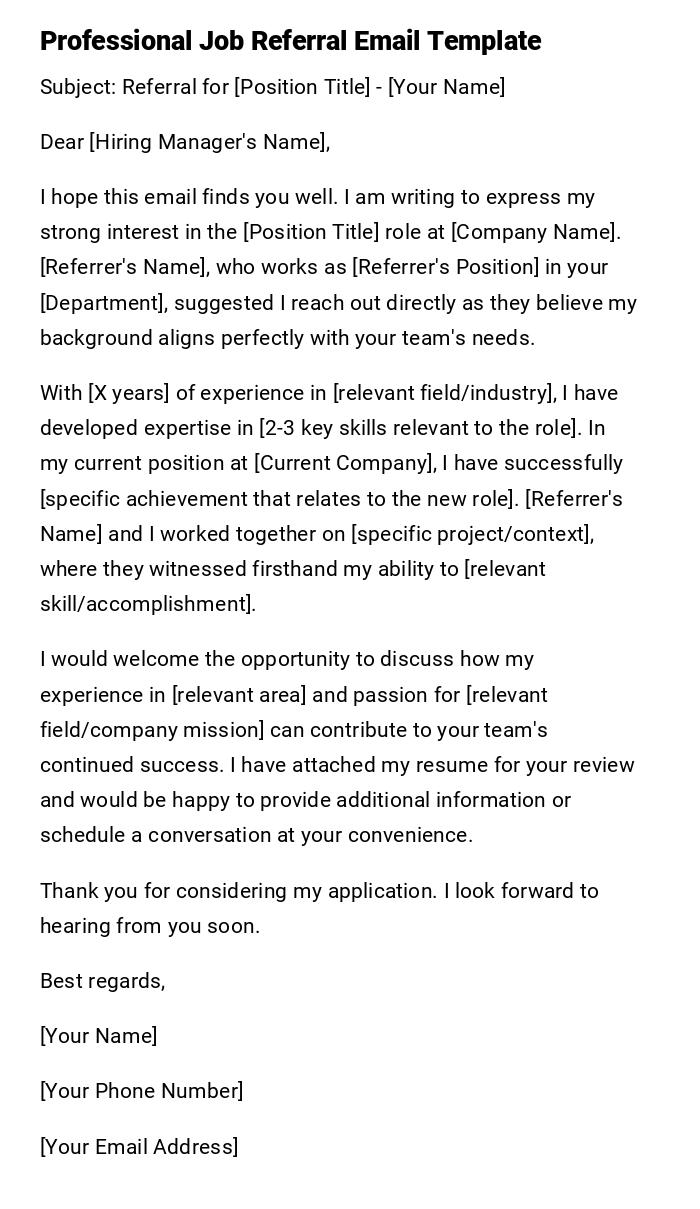
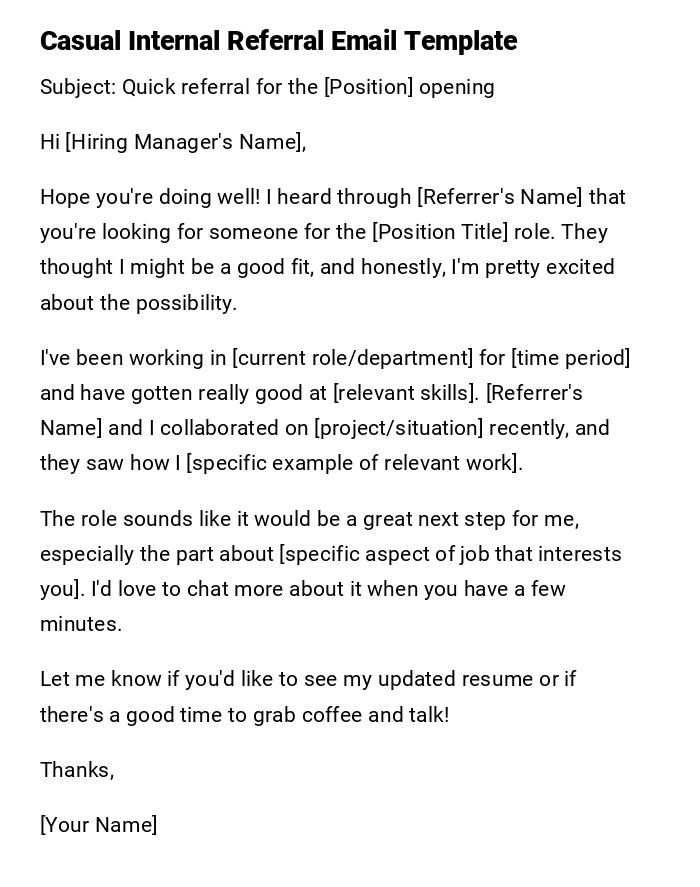
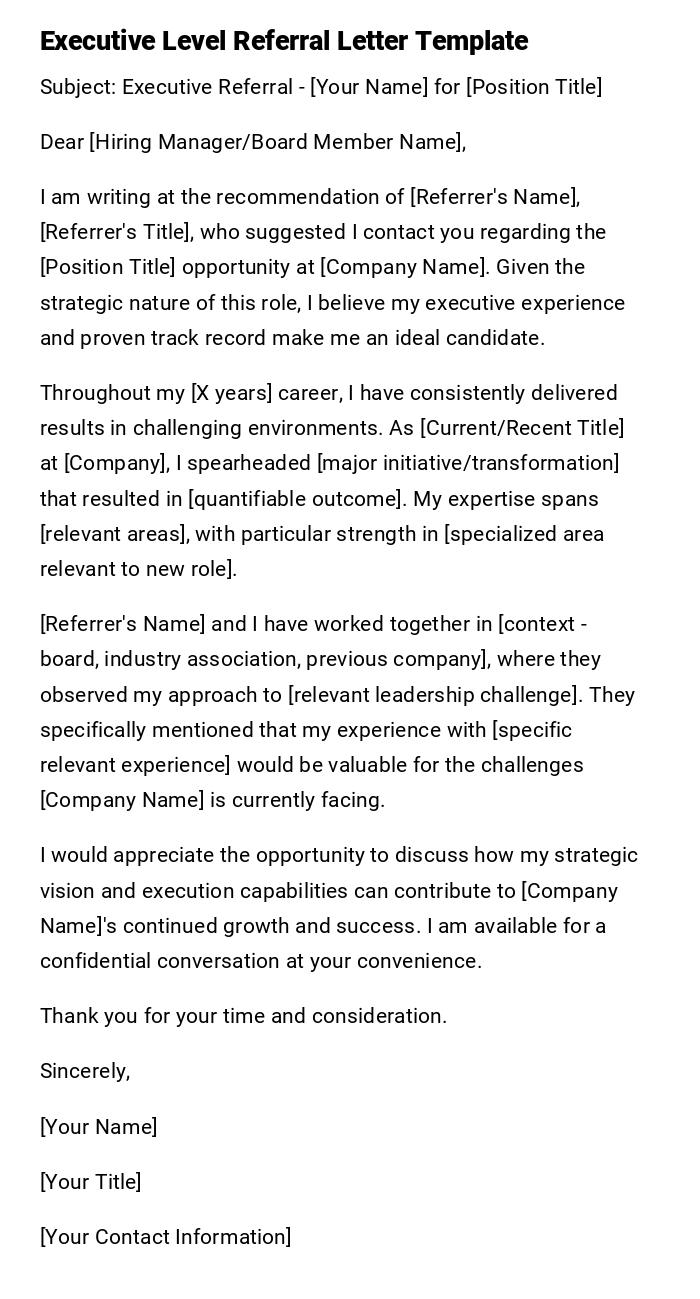
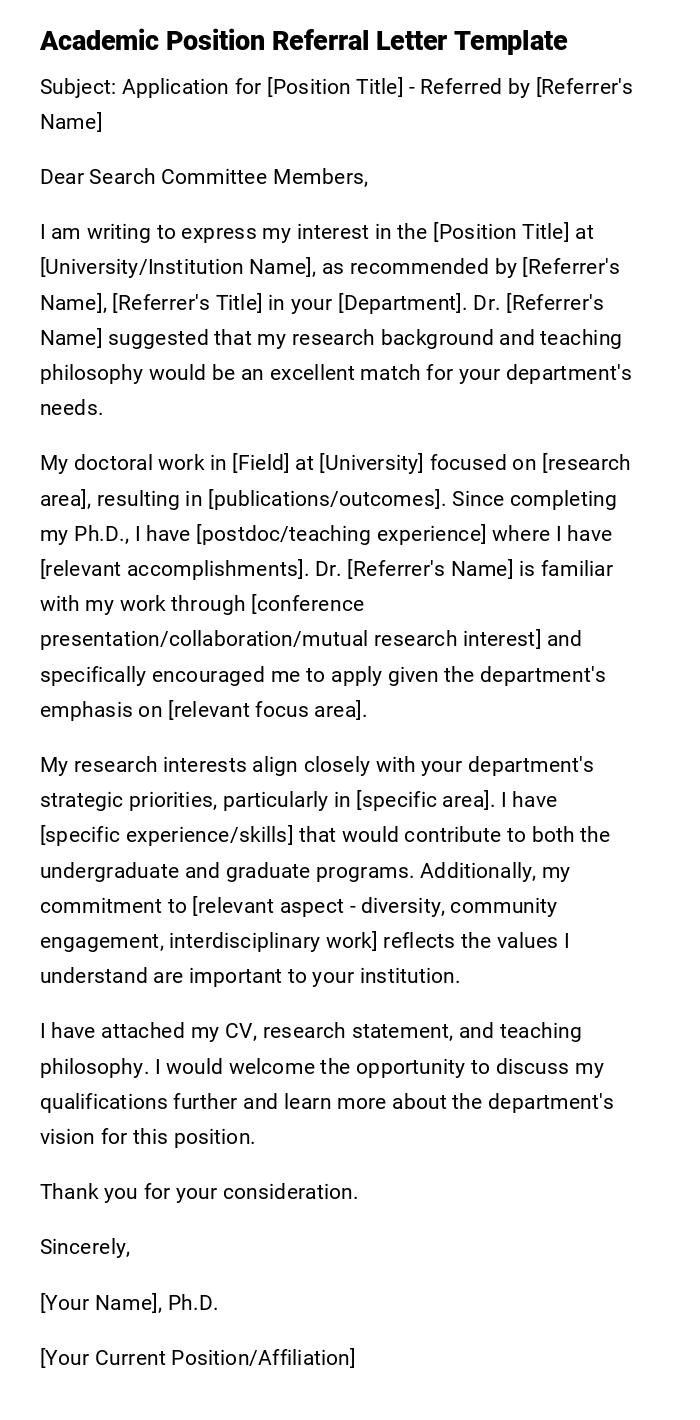
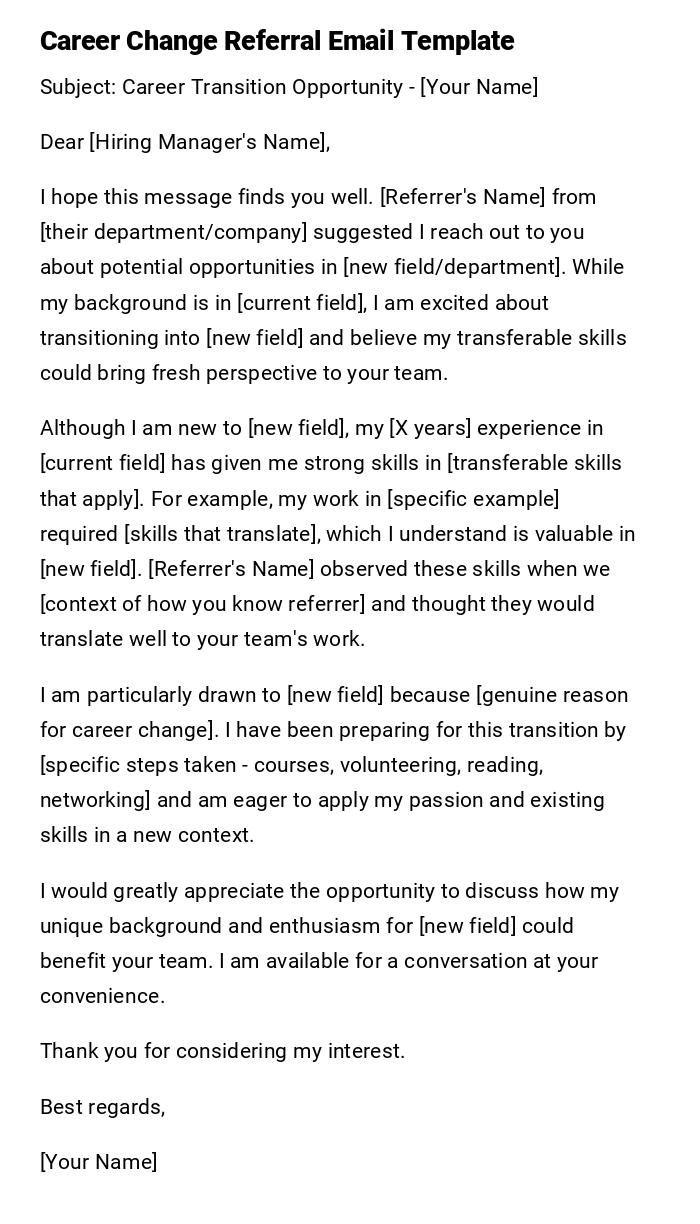
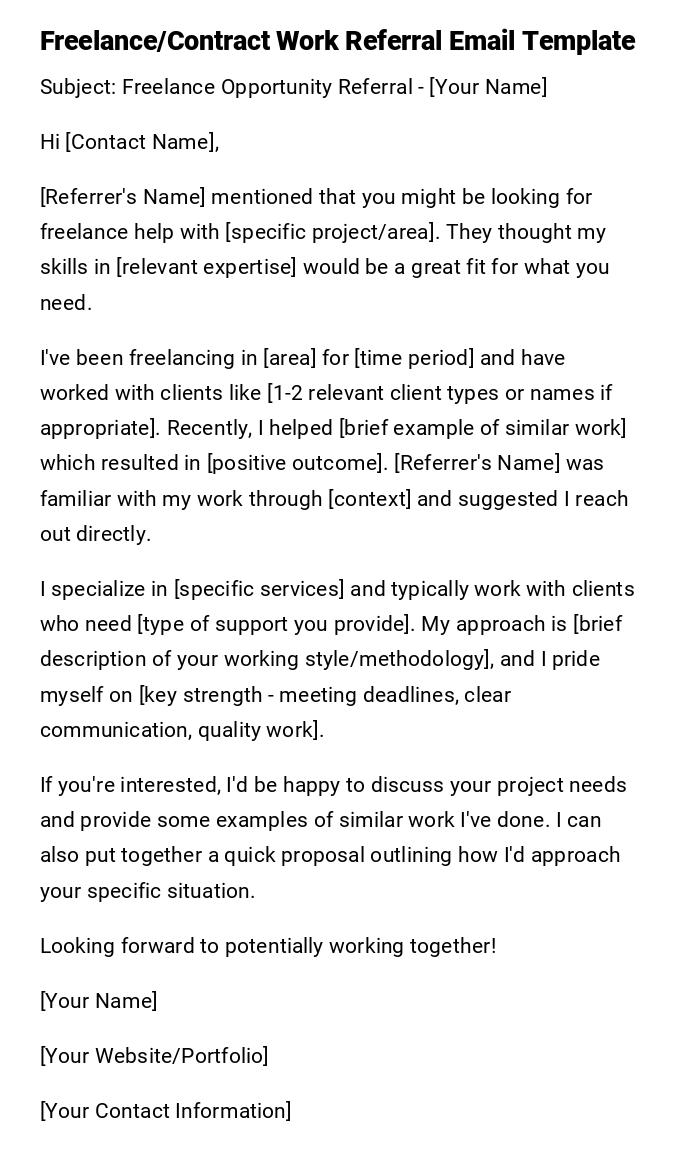
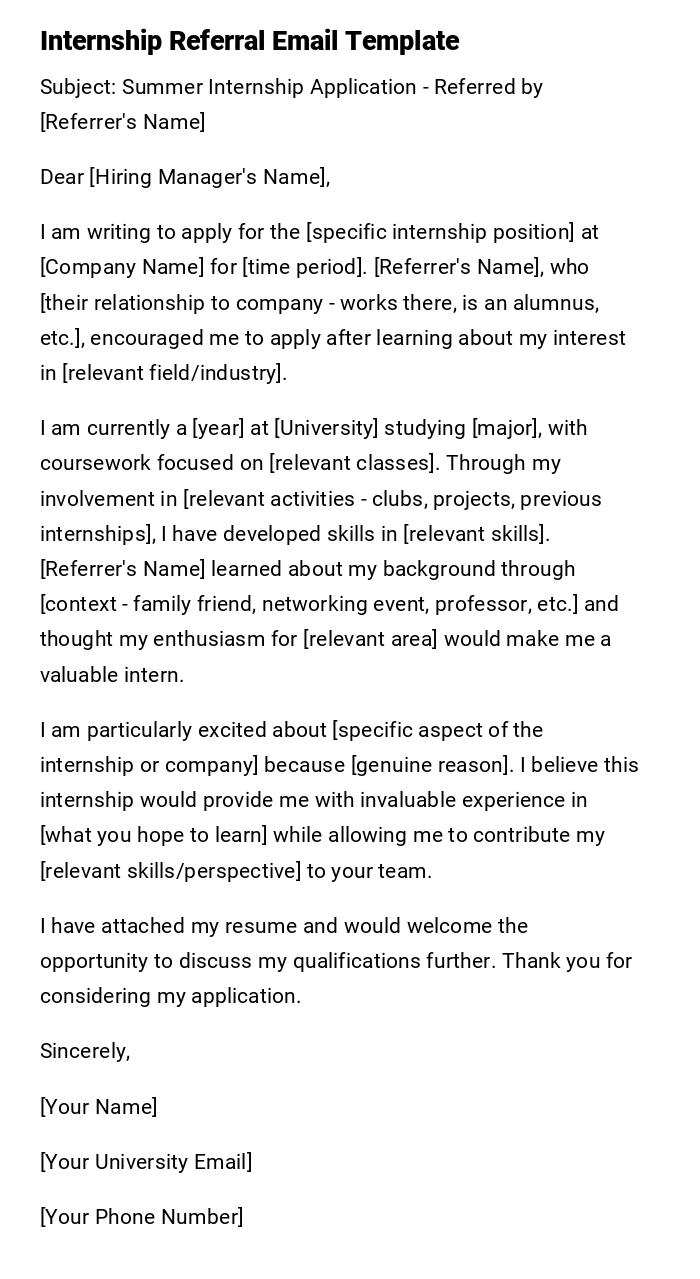
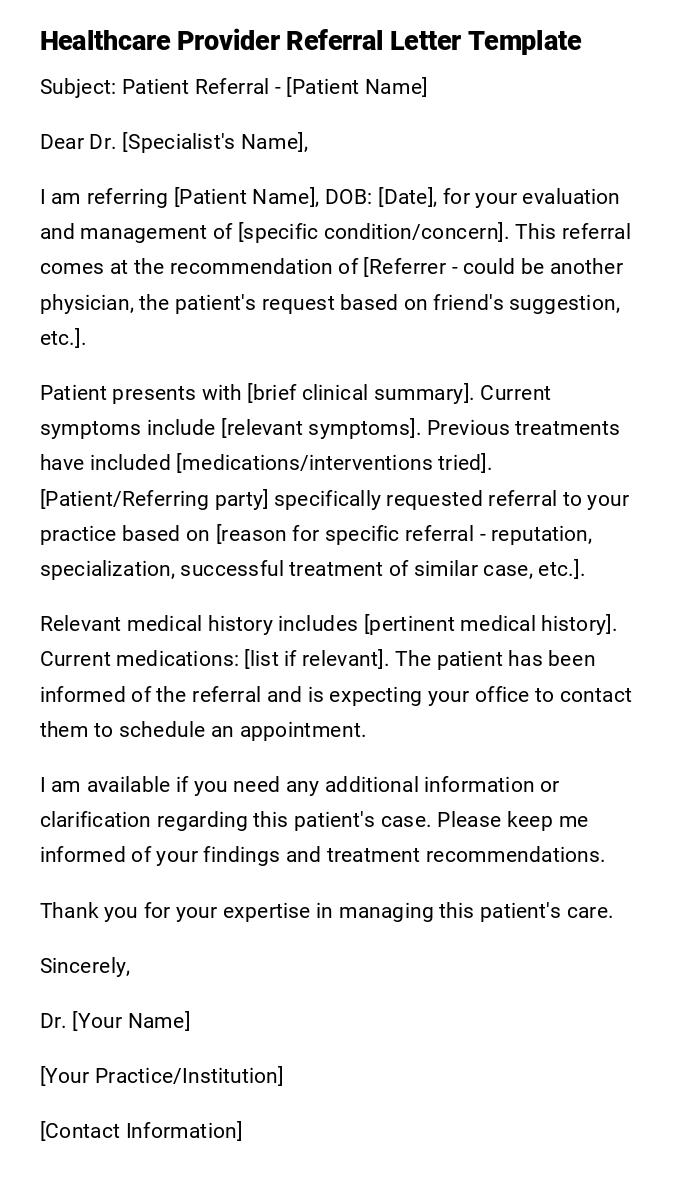

 Download Word Doc
Download Word Doc
 Download PDF
Download PDF